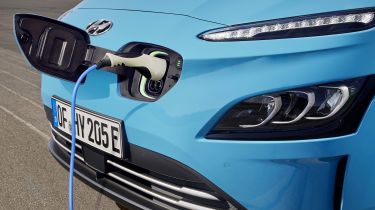Hyundai Kona Electric (2018-2023) review: range, battery & charging
The Hyundai Kona Electric offers very good range for the money – especially from the larger-battery 64kWh model
| Battery size | Range | Wallbox charge time | Rapid charge time |
|---|---|---|---|
| 39kWh | 189 miles | 6hrs (0-100%, 7.4kW) | 47mins (10-80%, 50kW) |
| 64kWh | 300 miles | 9hrs 15mins (0-100%, 7.4kW) | 48mins (10-80%, 100kW) |
With 300 miles on offer from its battery, the 64kWh Kona Electric is a tempting buy. There's also the option of a smaller-battery 39kWh version with a still-useful 189-mile range, which has the benefit of a more affordable starting price and may be worth looking at if you'll mainly be doing shorter trips.
Hyundai Kona Electric range
There’s no doubt range anxiety is becoming less and less of an issue across the board as EV battery and charging technology develops. Indeed, the official 300-mile range of the Kona 64kWh (early examples were capable of 280 miles) seems to cross a threshold of acceptability – giving electric-car drivers a similar amount of freedom to travel as a typical tank of fuel. Even the cheaper 39kWh version's 189-mile range isn't to be sniffed at, especially if you don't embark on cross-country jaunts.
Charge time
Big batteries take longer to charge than smaller ones, and it'll take around 28 hours to fully top up the Kona Electric 64kWh from a three-pin domestic socket. That's really only a last-resort solution, though: Hyundai provides a Type 2 cable that gives access to the vast majority of public rapid chargers, as well as home wallboxes. Using a 7.4kW wallbox reduces the charge time for the 64kWh Kona to a little over nine hours.
The Kona Electric is also capable of DC rapid charging, although it's worth noting the smaller-battery cars won't charge as quickly as the bigger-battery models. The 64kWh car can charge at up to 77kW, so plugging into a 100kW charger will see the Hyundai charge at that maximum rate – filling the battery from 10-80% in just under 50 minutes. The time is about the same for the 39kWh car, as it's battery is roughly half the size and it'll be charging at roughly half the speed.

